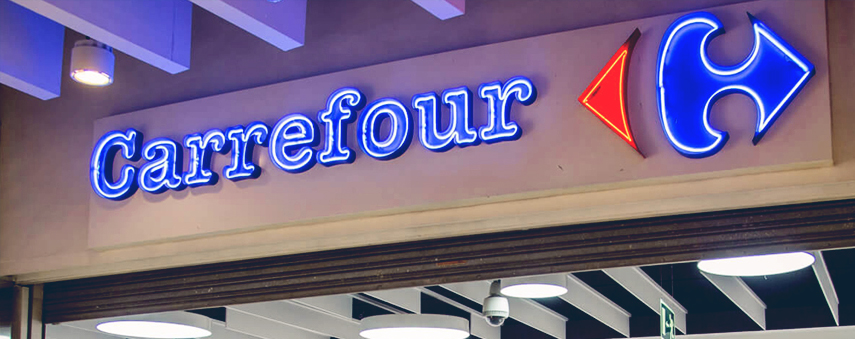Blockchain tracking is increasing sales for French retailer Carrefour

Supermarkets are more used to multi-buy offers and deli discounts when it comes to driving sales, rather than employing a blockchain project manager. French retailer Carrefour, however, is diving headfirst into the future to track produce.
Emmanuel Delerm has been working at Carrefour since 2015. The supermarket’s blockchain project manager, Delerm has implemented ledger technology. With this technology, Carrefour customers can scan a QR code on a product with their phone to obtain information to track meat, milk and fruit. Date of harvest, farm location, transport time and even tips on how to prepare the food are now at your fingertips.
Blockchain information was originally only available for twenty items. Since the success of the system though, Carrefour intends to add blockchain tracking to another 100 products. Blockchain tracking creates a “halo effect”, according to Delerm. If a Carrefour customer trusts one product, they are more likely to trust more.
The retailer is looking to implement blockchain technology on other items. Baby products are a prime target, as they’re items that require trust from a consumer.
What are the benefits and pitfalls of blockchain tracking?
“Garbage in, garbage out” is one of the blunter computer science concepts. It refers to the idea that incorrect input data only ever results in incorrect output data.
This is the biggest flaw of blockchain tracking. Suppose that a farmer enters false information for the products that they are sending to a supermarket. A blockchain database can be intact whilst displaying fraudulent data.
Radio Frequency Identification Device (RFID) tracking is one solution to this. Rather like a barcode, an RFID tag can be scanned at checkpoints on a journey from supplier to shelf. RFID systems include tags, data collection and a storage system; they eliminate the need for human input when it comes to supply chain information and add a level of transparency to a product’s journey.
Blockchain can actually hold businesses accountable for where they’re sourcing produce from and how they’re getting it to you.
Businesses that fail to adopt blockchain will die. That’s the view of many experts and it’s most prevalent in delivery goliath FedEx. FedEx is applying blockchain to monitoring applications inside its palletised freight section. The company are also pushing an initiative to involve the whole business with blockchain criteria, though. The technology offers benefits, particularly the secure sharing of information between business partners.
Implementing blockchain in real-world situations as well as digitally is a huge breakthrough. Blockchain uses a dispersed ledger of info which may be obtained by all members of a specific blockchain, but can’t be changed by any person without approval from the group. This makes it perfect for businesses looking to physically send items via FedEx, though this is not solely a FedEx foray. The business has joined industry groups such as the Blockchain Research Institute and the Blockchain in Transport Alliance, an industry trade group that serves to combine a wide array of member companies in guiding the growth of blockchain based data sharing applications from the transport industry.
As a board member of BiTA, FedEx is working closely with other members to develop industry standards. FedEx leverages technology to handle the large volumes of info needed to provide its clients with services like fast delivery and visibility into shipment locations, with the company already collecting a huge amount of data that it uses for its own internal performance metrics.
Blockchain is combining with IoT technology for better shipping data
Efficiency is vital in the world of supply and logistics. Of course, it’s vital that the right data is inputted into the blockchain and reducing as much human interference can lead to more accurate results.
IoT technology can help with delivering accuracy. Sensors in trucks, shipping vehicles and containers can detect the amount of space taken up in a shipment. IoT sensors can also monitor temperature and humidity, and all this data can be relayed back to the blockchain. if it’s important that an item of food stays refrigerated, IoT can ensure that it does. So when you’ve just picked up a packet of meat in the supermarket and you’re scanning the blockchain information, you can be sure that the produce hasn’t thawed and refrozen a handful of times before it made its way to your shopping basket.
IoT can also be used for Vehicle to Vehicle (V2V) communication. V2V ensures that a fleet of freight vehicles communicate to improve fuel efficiency. Guess what? This information can be stored in the blockchain too.
What seems like a handy gimmick from Carrefour could well become the norm for retailers. Blockchain can actually hold businesses accountable for where they’re sourcing produce from and how they’re getting it to you. A scheme to check that your chicken is fresh could well develop. It won’t be too long before you can check exactly where your clothes were made, or confirm that the potatoes you just bought were 100% British like the packaging stated.
